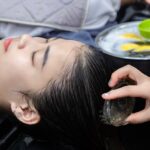- Sudden Death: Nighttime bathing can alter body temperature, causing blood to constrict and leading to a lack of blood flow to the brain. This can result in lung diseases and, in the worst cases, stroke or cardiac arrest. It is especially dangerous for those who are intoxicated, or have cardiovascular or hypertension issues.

- Chronic Headaches: Some people tend to bathe at night and go to sleep with wet hair. This can cause the scalp to become cold, leading to poor blood circulation and chronic headaches.

- Lung Infection: The lungs are one of the most sensitive organs in our body. Bathing at night can cause significant damage to the lungs as they are susceptible to the cold temperature of the water. Weakened lungs can lead to respiratory issues such as pneumonia.

- Impaired Blood Circulation: The normal human body temperature is 37 degrees Celsius. At night, the air temperature drops, and so does the water temperature. Nighttime bathing can cause blood vessels to constrict, hindering blood circulation. It can also lead to other issues such as shoulder and neck pain and potentially chronic conditions.
Ideal Bathing Times for Good Health
- Morning Bath: Taking a bath in the morning is highly beneficial for your body. Develop a habit of waking up early, exercising, and then relaxing with a bath. If you tend to sweat a lot during sleep, a morning bath will help remove toxins and improve your skin’s health.
- Before 7 PM: The ideal time to bathe is before 7 PM. After a tiring day, it helps to wash away the dirt, sweat, and fatigue.

Best Solution if You Must Bathe Late at Night
- If you must bathe late, opt for a warm shower and keep it brief.
- When washing your hair in the evening, remember to blow-dry it before going to bed.
- Avoid pouring water directly on your body suddenly. Instead, start by wetting your hands and feet and then move on to the rest of your body.
- Bathe before 11 PM and leave at least a two-hour gap before sleeping. If it’s too late, consider waking up early and bathing the next morning.
- Alternatively, you can use a cold compress on your head for about five minutes to lower your body temperature and enjoy a good night’s sleep without needing a late-night bath.
- After bathing, avoid direct exposure to cold air from air conditioners or fans. Adjust the air conditioner to a comfortable mode or sleep mode before going to bed.
Web and website development expert with over 15 years of experience. I’ve helped hundreds of businesses with their website development strategies to ensure sustainable growth and profitability.
The Secret to Unblocking Your Meridians With a Simple Clap
Clap your hands for better health! Did you know that clapping is not just a way to show appreciation but also a powerful tool for improving your well-being? From boosting your mood to enhancing your physical health, clapping offers a plethora of benefits that are often overlooked. Uncover the surprising advantages of this simple action and discover why it deserves a round of applause.
Why Keep Your Hands and Feet Warm During the Bitter Cold Winter?
“Why are you snuggled up under the covers, feeling a bit too warm, when all it takes is a quick adjustment to your bedding to find that perfect, cool temperature? It’s time to ditch the stuffy, overheated sleep and embrace a new way of resting. Imagine a breeze of fresh air as you drift off, a gentle caress that lulls you into a deep slumber. It’s time to unlock the secret to a good night’s sleep.”
“The Miracle Drink: A Budget-Friendly Beverage to Lower Bad Cholesterol and Prevent Stroke Risk”
“Pomegranates are revered for their abundance of antioxidants such as tannins, flavonoids, and anthocyanins – powerful compounds that neutralize free radicals and safeguard cells from damage. With their unique ability to scavenge and destroy these harmful free radicals, these antioxidants act as guardians of our cellular health, fortifying our bodies’ defenses and promoting overall wellness.”
The Four Hourly Showers to Avoid: A Guide to Healthy Hair Care
“Superstitions surrounding the timing of hair washing are prevalent in many cultures, with certain hours of the day deemed inauspicious. These beliefs hold that washing your hair during these hours can lead to adverse health effects, including an increased risk of stroke. However, it’s important to separate fact from fiction. While maintaining a healthy hair care routine is important, there is no scientific evidence linking hair washing to an increased propensity for strokes. So, feel free to wash your locks whenever suits your schedule, and rest assured that your health is not at risk from this age-old superstition.”




































